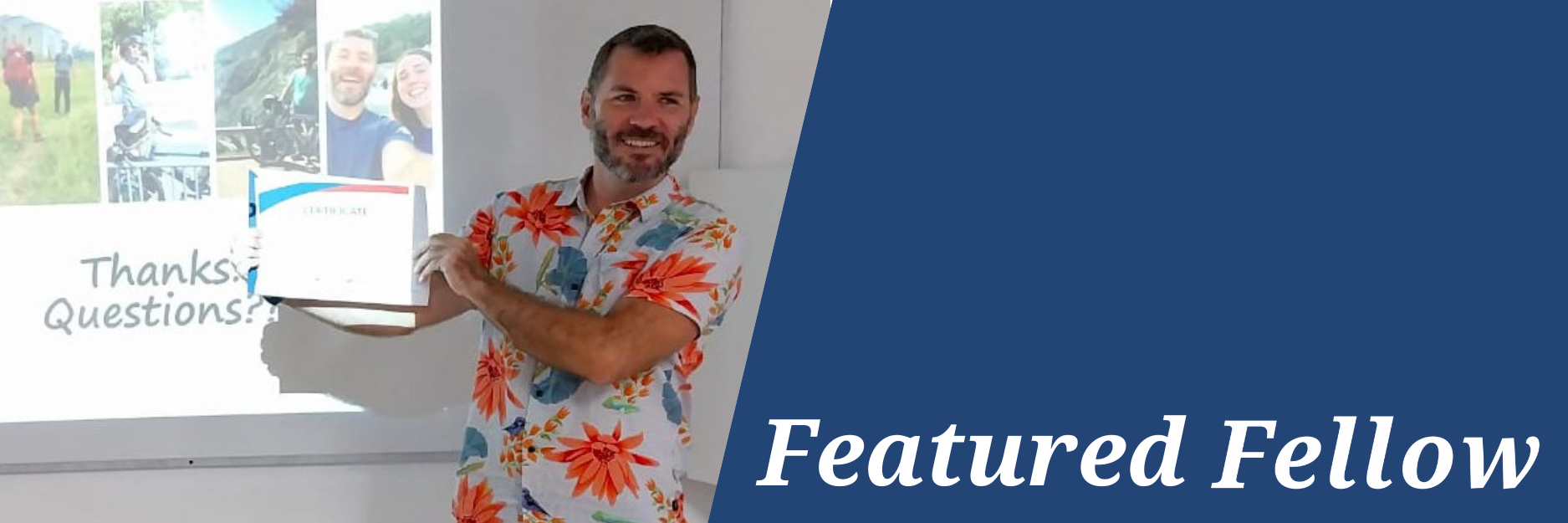English Language Fellow Chris Colwell’s first week in Brazil set the tone for what has proved to be a dynamic and enlightening two years working and living in the country. Arriving in the capital city of Brasília in 2023, Colwell met up with staff from the Regional English Language Office, the five other Brazil Fellows, and his host institution counterpart. Together, they toured the capital. On the tour, Colwell talked with his counterpart about the cultures, cuisines, and music of Salvador of Bahia, his host city, as well as their ideas, projects, and plans for the coming school year.
A few days later, Colwell visited five classes at a local public school in Salvador and got an exhilarating taste of what his time as a Fellow in Brazil would include: meeting and working with new students and teachers, sharing piquant moments of cultural exchange, and sampling an unlimited array of delicious foods. The students had many questions for Colwell, and he shared details about life in his home state of California. In each class, the students were surprised to find that Colwell had never tried acarajé, a favorite local food with West African roots. One teacher promised to fill this culinary void in Colwell’s life when the day wrapped up. “After class, we headed to a kiosk and got some acarajé, which are fried bean sandwiches, soaked in coconut milk and palm oil cream sauce, and topped with shrimp and diced green tomatoes,” Colwell recalled. “We ate them overlooking a beautiful sunset on the bay of Todos os Santos. A perfect ending to a great first week!”
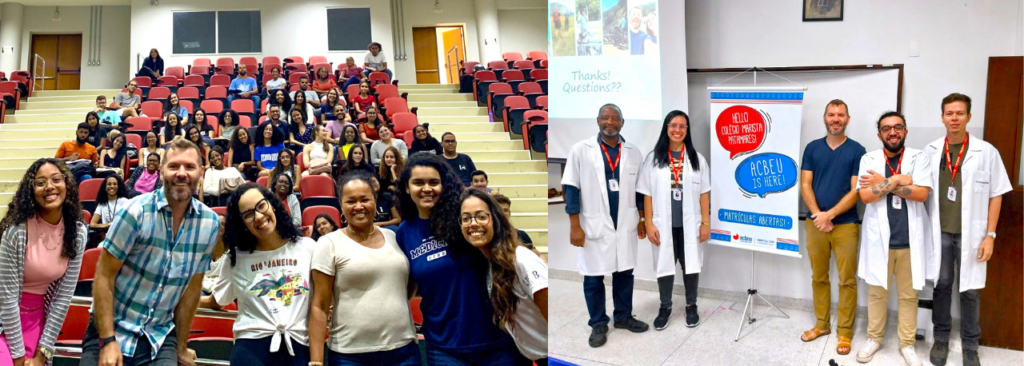
Visiting students at a medical university (left), and an American Space (right); Colwell led classes and discussions in his visits to numerous schools throughout his fellowship
As a Fellow in Salvador, Brazil, in 2022-2023, Colwell worked with students and teachers in the Humanities department at Universidade Federal da Bahia. When he was offered the chance to renew his fellowship for a second academic year in 2023-2024, his project shifted to the city of Belém, where he taught a four-skills English class and a composition class at the Universidade Federal do Pará (UFPA). His secondary duties in both cities consisted of planning and organizing conferences for English teachers and visiting a range of regional English classes to lead discussions. He visited primary schools, public and private middle schools and high schools, universities, and various American Spaces (known locally as Associação Cultural Brasil – Estados Unidos), as well as different classes at UFPA.
A Diversity of Professional Experiences
Visiting a medical university, Colwell provided his perspective on the basics of the U.S. healthcare system and how it compares to his experience with healthcare in Brazil. This sparked thoughtful discussions among the soon-to-be nurses, doctors, and other medical professionals. “The visit not only helped the students practice their English but highlighted the importance of cross-cultural understanding in healthcare,” Colwell said. Visiting an English for Tourism ESP class on the island of Combú, Colwell practiced roleplays with island residents focused on improving their English for an upcoming United Nations Climate Change Conference that Belém will host. “My class visits are always fulfilling, as they allow me to contribute to the students’ and teachers’ education and promote cultural exchange by sharing insights into U.S. culture, such as holidays and traditions to everyday life,” Colwell said. In addition, Colwell often leads teacher training workshops on various topics of interest, for example, on doing needs analysis and connecting it to student outcomes.
All of my experiences as a Fellow in Brazil will help me in my future teaching contexts, as well as help me contribute to the field of English language education in general.
Colwell’s growth as a conference organizer was instrumental in working with two other Fellows to plan this year’s Fellow mid-year event in Goiânia, Brazil. In structuring the programming for the event and communicating with other Fellows, Colwell said they tried to “tap into each Fellow’s interests and skills” and have them present on topics of choice. “Chris did a wonderful job in helping organize the Fellow mid-year event and creating a positive experience for all ten Fellows who attended,” said Regional English Language Officer Scott Chiverton.
Visiting an English for Tourism ESP class on Combú island (left); facilitating a Professional Learning Community session (right)
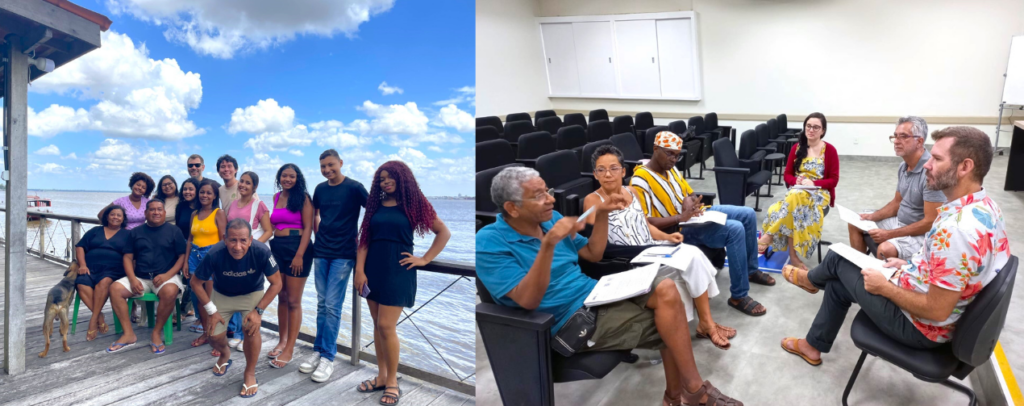
Creating a Professional Learning Community
Another hallmark of Colwell’s time as a Fellow was the Professional Learning Community (PLC) he created. Working with local counterparts, he led a six-week PLC course for public and private school English teachers in Salvador and local areas. “The aim of the PLC was to create a safe space for teachers to explore and express their unique perspectives and experiences as professional educators,” Colwell said. Through discussions and guiding questions, Colwell encouraged participants to share their teaching stories, challenges, and triumphs. He also facilitated discussions on highlighting minority voices in their communities and classrooms through cultural sensitivity and effective communication strategies. “By fostering a safe and collaborative environment, we explored different approaches to empower minority voices, foster inclusivity, and promote social justice,” Colwell reflected.
Bicycle riding, Swimming, and ‘Divine açai’
Bicycle riding is a popular means of transport in Belém, Colwell noted. And impressive are the loads the locals haul with them on their bikes. “Most cyclists carry things with them when they ride around Belém, and sometimes big things like propane tanks, watercooler jugs, or plexiglass boxes filled with fried food the rider is selling,” Colwell reported. “Oftentimes, people carry people, too, with passengers straddling or sitting side-saddle on bike racks.” While he too has taken up daily bike riding to get around the city, Colwell limits his cargo to his teaching supplies.
Located just a touch south of the equator, Belém has a sultry tropical climate. Bike riding there gets hot. Colwell likes to cool off with a swim in the Rio Guamá. “And, of course, I eat lots of ice cream,” Colwell said. “There’s a popular ‘sorveteria’ (ice cream parlor) by my apartment that’s famous for their Amazon fruit flavors, fruits I’ve never really seen in other parts of Brazil: uxi, taperebá, bacuri, and cupuaçu. But açai is the flavor to get, deep purple and silky smooth. It’s divine.”
Along with great ice cream, Belém has a plentitude of gastronomic pleasures Colwell savors. “I like to get grilled fish, usually filhote, with jambu rice and beans and a side of açai mixed with crunchy farinha,” Colwell said. “I like thick and creamy vatapá, which is an Afro-Brazilian dish made with shrimp broth, wheat flour, coconut milk, tomatoes, peppers, and onions.) topped with shrimp, and a helping of maniçoba and a side of rice. It’s very exotic food to me, but it also feels like comfort food, too.” Eating and bike riding are connected pastimes in Belém for Colwell, as he enjoys discovering new restaurants while exploring the city by bike.
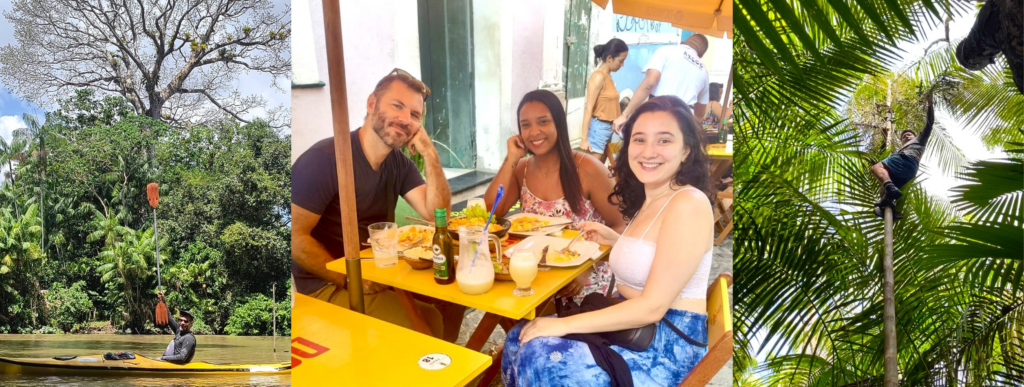
Kayaking near the island of Combú (left); lunch with friends in Salvador (center); watching friends harvest açai at their home on Ilha Tucupi
Indelible Moments and a Sense of Belonging
For Colwell, the friendships he’s made in Brazil have been the most profound part of his fellowship. “I’ve been lucky to connect with so many people from diverse backgrounds, including educators, students, locals, and immigrants from other countries,” Colwell said. “My friendships are special to me as they’ve been my support while living and working abroad. They’ve helped me develop a strong sense of belonging that has made my time here in Brazil even more meaningful.”
One of Colwell’s favorite experiences was learning about açai harvesting while visiting his friend on the island of Tucupi. Colwell recounted the harvest, a family affair, in detail: “My friend’s brother tied a thick cotton band between his feet and hopped on to an açaí palm. He hugged the trunk and shimmied to the top using the band to get purchase on the smooth trunk. He unhinged a branch full of açaí fruit from the trunk and slid back down to earth. Then, they stripped the açaí from its branches into a straw-like basket called a panero, while their mom and sister boiled water to rinse and clean the açaí. They scooped the clean açaí into a stainless-steel cylinder where an electric motor spun metal plates to skin the fruit of its flesh. Periodically, they poured water into the cylinder to create the dark purple liquid that’s filtered one last time before being served with homemade farinha. It was great to see this process. Açai is a staple here. My friend’s family eats it with every meal.”
In the capital city of Brasilia, Colwell spent time with other English Language Fellows and their Brazilian counterparts (left); leading a teacher training session in Salvador (right)
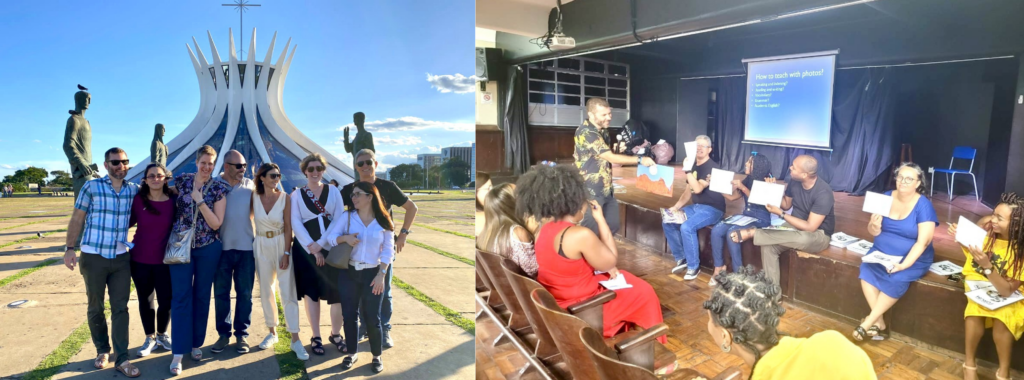
‘The Projects Facilitate the Friendships’
Colwell attributes getting to experience these indelible moments of cultural exchange with new friends to his hard work in the classroom. “The projects facilitate the friendships,” Colwell said, explaining that by taking on new work projects he’s always meeting new people and forming new bonds. “I enjoy learning and sharing with people from different communities and cultures here,” Colwell said. “I like practicing the language, and exploring the customs and traditions of the Amazon.”
Colwell’s fellowship in Brazil has whetted his appetite to continue exploring South America. When he finishes his project, he plans to travel through Argentina and Chile for several months. Career-wise, he’s looking forward to finding a new role in the public school district in Berkeley, California, where he taught previously, or perhaps teaching abroad again in Colombia. “My experiences teaching here have allowed me to build and refine my teaching strategies and methods in higher education contexts and have motivated me to stay up to date with current research and resources in the field,” Colwell said. “All of my experiences as a Fellow in Brazil will help me in my future teaching contexts, as well as help me contribute to the field of English language education in general.”
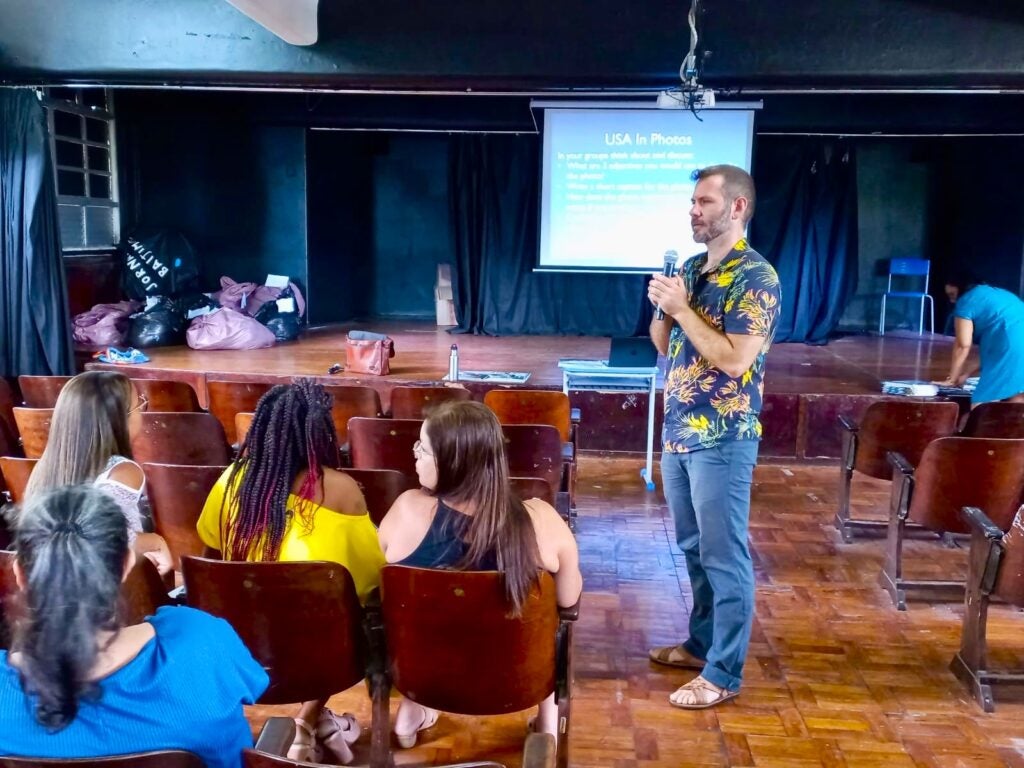
Chris Colwell started his career in education as a Peace Corps Volunteer in Panama in 2010, teaching at a local primary school. After Panama, he taught in China, Korea, and Turkiye. When he returned to the U.S., he started teaching ESL at the Berkeley Adult School, where he worked on and off for the next eight years. In 2019, Colwell became an English Language Fellow in Chihuahua, Mexico. When his fellowship was shortened due to the pandemic, he adapted to remote teaching and working on virtual projects in Mexico from his home in Berkeley. In 2021, he transitioned to teaching middle school at King Middle School in Berkeley. In 2023, he became an English Language Fellow in Brazil, working on a project in Salvador da Bahia in 2022-2023, and on a project in Belém do Pará in 2023-2024.

